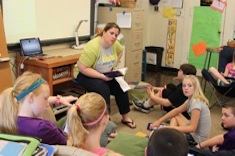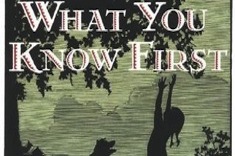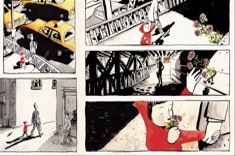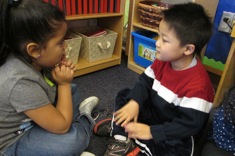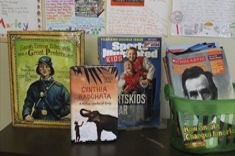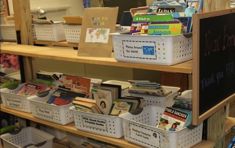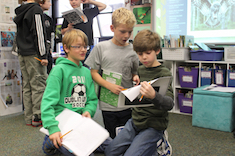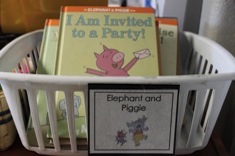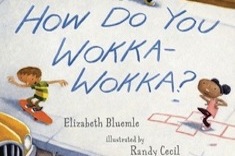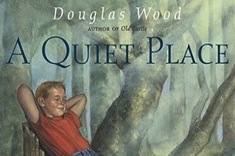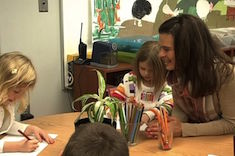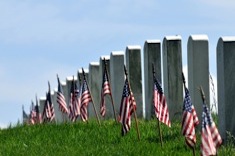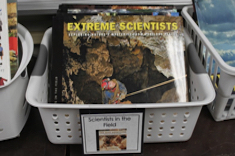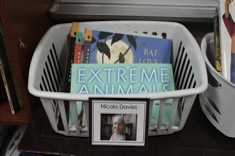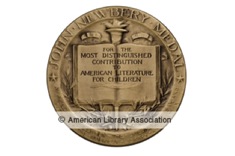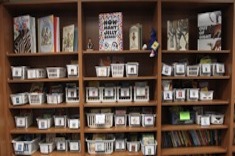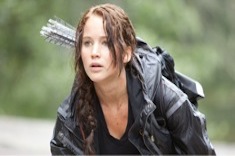Booklists
There are so many wonderful new children's and young adult books published each year -- and there is a lot of dreck out there too. We aim to be curators as we sort through, organize, and group books so that you can find just what you need. Whether it's mentor texts for a unit on persuasive writing, or just-right books for a fifth-grade English language learner, we've scoured lists of award winners, recommendations from colleagues, and the Kidlitsophere to come up with these lists.
Latest Content
Read Alouds as “Third Things”
Katherine Sokolowski uses read alouds early in the year to help students reflect on how to be kind and thoughtful members of a classroom community.
Student-Created Text Sets
Jillian Heise’s middle school students design text sets late in the school year. It’s a great activity for discovering how they have grown as readers, as well as a gift to next year’s class.
Closing the Year and Making Space to Remember
Jan Burkins and Kim Yaris explain how ending the year is all about making space for memories, and provide some texts to help in the process.
Favorite Wordless Picture Books for Teaching Inference
Jan Burkins and Kim Yaris present some of their favorite children’s books for teaching inference.
Using Picture Books to Foster Resilience
Gigi McAllister uses picture books to strengthen her fourth-grade classroom community.
How to Speak “Friend”
Melissa Kolb shares some of her favorite mentor texts for helping preschoolers understand friendship.
Blurring Genres and Real-Life Readers
The line between fiction and nonfiction can be fuzzy, but Tony Keefer finds what matters most is finding texts that captivate readers.
Exploring Literary Nonfiction with Middle School Students
Holly Mueller and her middle school students have fun exploring the creative aspects of literary nonfiction.
Nine Picture Books for Teaching Mindfulness
Kim Yaris and Jan Burkins conclude their series on integrating children’s literature and mindful teaching.
Multicultural Series Books
Shari Frost is alarmed when she realizes how rarely children of color are represented as main characters in book series. She decides to compile a list of multicultural series books.
Eight Picture Books That Show (vs. Tell) How to Be Mindful
Jan Burkins and Kim Yaris continue their series on teaching mindfulness with picture books.
Top 10 Intermediate Books for Boys
Katherine Sokolowski finds many of the boys in her classroom love to read about violence, weapons, and crude humor. She challenges teachers to appreciate boys’ interests and set some of our own criticism aside.
Books for Studying Illustration with First Graders
Katie DiCesare has suggestions for books to support an illustration unit early in the year.
Books for Brain Breaks
Mandy Robek compiles a list of her favorite books for brain breaks with young learners.
A Strong Foundation: Books and Media for Launching Literacy Workshops
Help students transition back to school with minilessons that give children a strong sense of the purpose of literacy workshops.
Launching Writing Workshop: Mentor Texts
Mandy Robek shares her favorite texts for building understanding early in the year of writing workshop with young writers. These books are ideal for launching discussions about how writers find ideas.
Launching Reading Workshop: Mentor Texts
Mandy Robek shares her favorite texts to use early in the year with young students to introduce them to everything from places to read to how to handle books.
A Booklist for Memorial Day
Sarah Klim’s latest booklist includes titles for honoring those who serve on Memorial Day.
Conferring About Independent Reading
Karen Terlecky confers with Alex, a fifth grader who needs help choosing books for independent reading.
Celebrating Screen-Free Week (BOOKLIST)
Screen-Free Week is scheduled for May 5-11 this year. Here are some book suggestions to help you explore the issue with students.
A Booklist for Earth Day
Earth Day is celebrated on April 22. Sarah Klim presents some favorite titles to share with students and build awareness in this booklist.
The Power of Mystery Series for Teens and Tweens
Ruth Shagoury shares her top picks of mystery series for teens and tweens.
Children’s Literature for the Olympics
The Olympics are just around the corner, and Sarah Klim has suggestions for read alouds in a new booklist.
Rethinking Nonfiction Topic-Based Text Sets
Franki Sibberson concludes her series on redesigning nonfiction sections of classroom libraries in the age of the Common Core.
Rethinking Nonfiction Series Books
Franki Sibberson explains how she features nonfiction series books in her classroom library.
Rethinking Nonfiction Author Baskets
Franki Sibberson realizes she needs to highlight nonfiction authors in new ways in her classroom library.
Mock Newbery Club
Katherine Sokolowski has suggestions for organizing and hosting a Mock Newbery Club in the weeks before the award is given in late January.
Curating a Nonfiction Classroom Library
Franki Sibberson writes about how her thinking about nonfiction is changing her classroom library in this first installment of a four-part series.
November Contract: Family and Memoir
The November installment of Megan Ginther and Holly Mueller’s yearlong literacy contract series has a theme of family and memoir.
She Wants to Be Katniss for Halloween: Courageous Girls in Books
Shari Frost celebrates a tomboy who finally finds a female character she wants to emulate with a booklist highlighting courageous girls.
Browse Content By
Type
Category
- Assessment Tools
- Big Fresh Archives
- Booklists
- Choice Numeracy
- Classroom Design
- Common Core
- Community Building
- Conferring
- Content Literacy
- Digital Literacy
- English Language Learners
- Equity
- Family Relations
- Free Samples
- Guiding Groups
- Leadership
- Literacy Coaches
- Mentor Texts
- Minilessons
- New Teacher Mentors
- Podcasts
- Poetry
- Quote Collections
- Reading Strategies
- Self Care
- Struggling and Striving Learners
- Talking and Listening
- Teacher Study Groups
- Teaching Reading
- Teaching Writing
- Word Study and Vocabulary
Author
- Melissa Quimby
- Nawal Qarooni
- Gwen Blumberg
- Julie Cox
- The Lead Learners
- Hannah Tills
- Josie Stewart
- Ruth Metcalfe
- Mallory Messenger
- Becca Burk
- Jodie Bailey
- Vivian Chen
- Mary Brower
- Tiffany Abbott Fuller
- Stephanie Affinito
- Ruth Ayres
- Leigh Anne Eck
- Heather Fisher
- Shari Frost
- Julie Johnson
- Suzy Kaback
- Gigi McAllister
- Shirl McPhillips
- Melanie Meehan
- Cathy Mere
- Debbie Miller
- Tara Barnett and Kate Mills
- Tammy Mulligan
- Dana Murphy
- Bitsy Parks
- David Pittman
- Brenda Power
- Heather Rader
- Matt Renwick
- Mandy Robek
- Christy Rush-Levine
- Gretchen Schroeder
- Jen Schwanke
- Brian Sepe
- Katherine Sokolowski
- Stella Villalba
- Jennifer Vincent
Grade Level
Choice Literacy Membership
Articles
Get full access to all Choice Literacy article content
Videos
Get full access to all Choice Literacy video content
Courses
Access Choice Literacy course curriculum and training

